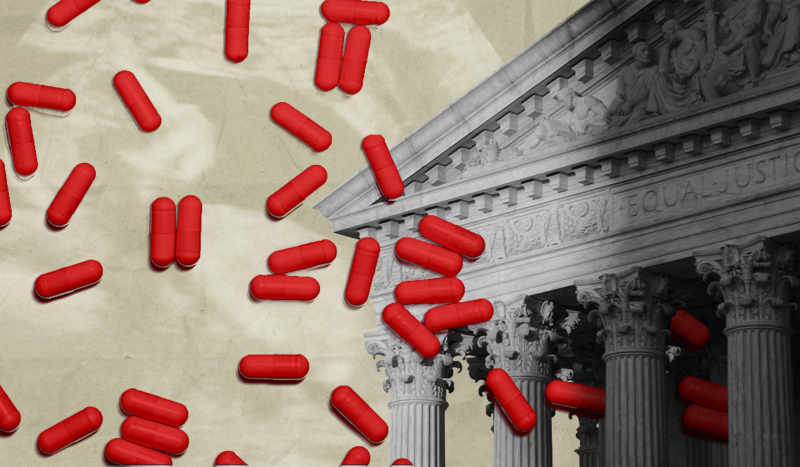
CV NEWS FEED // The United States Conference of Catholic Bishops (USCCB) has released a detailed explainer on the deadly chemical abortion drugs that will be the center of an upcoming Supreme Court case.
The Secretariat of Pro-Life Affairs for the USCCB released last week the Q & A-style explainer tackling questions about the risks of chemical abortion, how the two-pill regime operates, and the Food and Drug Administration’s (FDA) accelerated approval of the drugs.
“Chemical abortion is a two-drug process intended to kill and expel a developing child from the womb in the first trimester of pregnancy,” the USCCB stated, noting that it is misleading to call the chemical drugs “medication” since they intend the death of a patient, not the healing.
The first drug used in a chemical abortion is called mifepristone, which “blocks progesterone, a hormone essential to maintaining pregnancy,” effectively starving the child and cutting of his or her supply of oxygen, the USCCB stated:
Mifepristone alone will usually kill the developing child, but his or her remains may not be expelled. This can lead to infection, sepsis, and even the mother’s death. Therefore a second pill—misoprostol—is taken 24 to 48 hours later, to induce uterine contractions strong enough to expel the dead child and placenta.
The USCCB highlighted that there is an abortion reversal pill that can be used before misoprostol is taken, and “has a 66% success rate in saving babies’ lives.”
The chemical abortion drugs have a history of also harming women, the USCCB stated:
The FDA’s record of ‘adverse events’ cites 32 women’s deaths from September 2000 through December 2022. Although the FDA stopped requiring reports of non-fatal adverse events in 2016, it reports a total of 4,218 adverse events, including 1,049 hospitalizations (excluding deaths), 604 cases of blood loss requiring transfusions, 97 ectopic pregnancies, and 418 infections (75 of them “severe”).
The FDA approved mifepristone and misoprostol in 2000, an approval that has since been heavily criticized by pro-life legislators, activists, and doctors. The Supreme Court of the United States (SCOTUS) is set to hear arguments for the U.S. Food and Drug Administration (FDA) v. Alliance for Hippocratic Medicine in March that will determine the future of mifepristone’s availability.
“According to a lawsuit filed in November 2022 by the Alliance for Hippocratic Medicine and others, the FDA has ignored risks to women, its own regulations, and federal statutes to promote chemical abortion,” the USCCB stated:
The FDA approved mifepristone for abortion in 2000 using an “accelerated” review process that applies only to “certain new drugs that . . . treat serious or life-threatening illnesses and that provide meaningful therapeutic benefit to patients over existing treatments.” Even the pro-abortion Population Council, which holds the U.S. patents for the drug, had objected that pregnancy is not an “illness.”
There are also no set age restrictions on the use of the chemical abortion drugs, the USCCB noted, “and [the FDA] failed to incorporate safeguards used in the clinical trial submitted to justify FDA approval, such as the requirement for an ultrasound exam to confirm gestational age and detect a dangerous ectopic pregnancy.”
Since 2000 the FDA has dropped other safeguards and widened access to chemical abortion drugs, making them available even by mail to states where abortion is illegal.
“These latest changes increase risks to women by removing the opportunity for professional assessment of factors such as the stage of pregnancy and whether it is ectopic, and by preventing meaningful follow-up,” the USCCB stated. “They also make abortion drugs more readily exploited by abusers and human traffickers.”
The SCOTUS case set for March “is also important to an Administration pledged to maximize nationwide access to abortion, as chemical abortions now make up a majority of all abortions in the U.S.,” the USCCB stated.
President Joe Biden’s reelection campaign has centered around prioritizing abortion access in the United States. Bishop Michael Burbidge of Arlington, Virginia criticized Biden for “[placing] ‘choice’ over his sacred duty to protect life.”
“The issues at stake are of great importance,” the USCCB stated:
Many states have responded by enacting laws against abortion, which could be explicitly overturned or rendered ineffectual by a federal mandate to allow delivery of abortion drugs through the U.S. Postal Service. This case will help determine whether abortion is promoted throughout the country as a routine form of “medication.”

